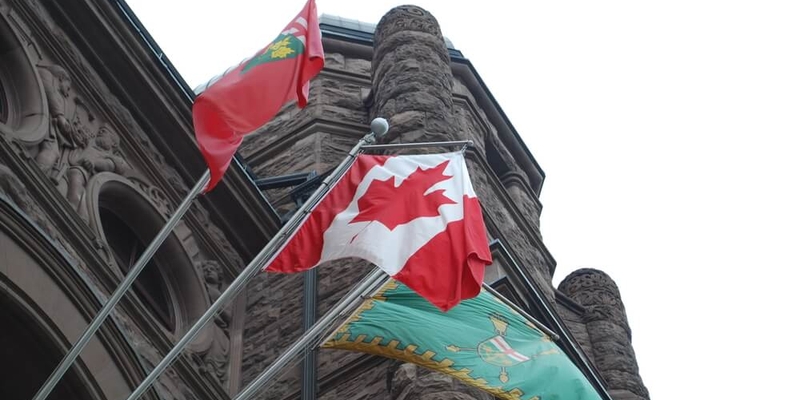
If you are not redirected within 30 seconds, please click here to continue.
Samedi: 10h – 16h HAE

If you are not redirected within 30 seconds, please click here to continue.
If you are not redirected within 30 seconds, please click here to continue.
Ontario’s budget 2024: Drivers will soon be able to opt out of certain mandatory auto insurance coverage

On March 26, Finance Minister Peter Bethlenfalvy tabled Ontario’s 2024 Budget. The government proposed an approach that could make certain previously mandatory insurance coverage optional, and alongside, strategies to tackle the province’s ongoing auto theft crisis.
Here’s a breakdown of everything you need to know about how the budget affects your auto insurance needs.
Bolstering police supports to combat auto theft
In Ontario, a car is stolen every 48 minutes, and in 2022, auto-theft claims amounted to a staggering $1.2 billion.
To address this increasingly dire car theft crisis, the government is collaborating with municipalities and federal authorities, allocating $49 million over three years to apprehend auto thieves. These funds also support the Ontario Provincial Police (OPP) Organized Crime Towing and Auto Theft Team.
The Financial Services Regulatory Authority of Ontario (FSRA) is also set to launch an anti-auto-theft campaign to raise consumer awareness.
In addition to the investments made to police, the Minister also committed $46 million to fund a new air support program, including the acquisition of four helicopters for police services in the Greater Toronto area, aiming to boost patrols and response times during critical incidents.
“We are investing heavily in auto theft, providing first responders with the tools that they need, including the four helicopters that we’ve announced in this budget,” said Bethlenfalvy.
Related: Thefts drive up insurance premiums by 25% on the most stolen vehicles
Ontario’s proposed auto insurance reforms give consumers more choice
As stated in chapter 1, section B: Working for you section of the budget, “mandatory auto insurance accident benefit coverage will continue to apply to medical, rehabilitation and attendant care benefits, while all other benefits would become optional.”
The new measures increase what the industry calls "optionality" for drivers, allowing for more leeway to pick and choose their accident benefits coverage plan. By being able to opt out of what was once mandatory coverages, Ontarians have more options to reduce their premiums.
For example, drivers who already receive benefits through their workplace plans may be able to avoid duplicate payments for the same coverage in their auto insurance policies.
However, drivers’ auto insurance companies will still be the ‘first payer’ for covering medical and rehabilitation benefits after an auto accident before any extended health care plans kick in. This applies to all accidents, regardless of the injury.
“We’re moving forward with auto insurance reforms that would provide more choice and flexibility to drivers in order to keep their premiums more affordable,” Finance Minister Peter Bethlenfalvy said during his speech introducing the budget.
However, this proposal comes with criticism, particularly from NDP Leader Marit Stiles who suggests that “this is going to force Ontarians who are looking for more affordable options frankly to take on an additional risk that they shouldn’t be forced to take on."
Currently, as it stands, this announcement is a policy decision, not legislation. Ontarians can expect legislation to come in the late Fall or early Winter of 2024. The final implementation of these measures is intended to be sometime in 2026.
Related: Higher car expenses leading more Canadians to make changes to their driving
What are the standard accident benefits coverage in Ontario?
Accident benefits form a crucial part of every car insurance policy in Ontario. If you find yourself needing time to recover after an accident, accident benefits come into play.
Ontario operates under a no-fault insurance system. This means whether you’re the driver (regardless of fault), a passenger, pedestrian, or cyclist, these benefits apply.
The main types of Ontario accident benefits are as follows:
- Medical, rehabilitation, and attendant care benefits: If you’re injured in an accident, this benefit covers expenses not covered by OHIP or other health insurance. It includes essential services like surgery, dental care, hospitalization, ambulance, prescription eyewear, mobility devices, physiotherapy, psychological and occupational therapy, family and financial counseling, and chiropractic care.
If you need assistance due to injuries (e.g., bathing, dressing, using the washroom), this benefit also pays for hiring someone to care for you at home or in a health care facility.
- Income replacement, non-earner, and caregiver benefits: If you’re unable to work due to injuries from an accident, the income replacement benefit provides income replacement. Typically, you can claim 70% of your gross income, up to $400 per week.
For those who don’t qualify for income replacement (e.g., full-time students), non-earner benefits may pay $185 per week in compensation.
Additionally, if you suffer a catastrophic injury, caregiver benefits help cover expenses for hiring someone to care for dependents (e.g., children or senior parents).
- Death and funeral benefits: In unfortunate cases of death due to a collision, your spouse is entitled to $25,000, and each dependent (children) can receive up to $10,000. An additional $6,000 is available to pay for funeral expenses. These coverage limits can be increased to $50,000 for your spouse, $25,000 for each dependent, and $8,000 for funeral expenses.
Some other miscellaneous benefits
- Lost educational expenses: If injuries prevent you from continuing your education, coverage is available for tuition, books, materials, and room and board.
- Damage to clothing and medical devices: Your insurer will replace damaged clothing worn during the accident. Coverage also includes prescription eyewear, hearing aids, and other lost or damaged medical devices.
- Cost of examinations: As part of your rehabilitation, your insurer compensates you for medical examination costs during recovery.
- Expenses of visitors: While recovering, expenses incurred by family members or others who lived with you at the time of the accident can be claimed.
- Housekeeping: For catastrophic injuries, if you need help maintaining your home, you can claim up to $100 per week.
While the proposal to have a wider range of options to reduce premiums is great in theory, drivers must be well informed of the potential consequences of opting for less coverage. These coverages are what you can expect to lose if you in the future decide to opt out.
Read more: What do accident benefits in Ontario cover?
From Proposal to Policy Form – A short history of OPCF 49
The reforms introduced in this budget continue a trend of ‘optionality’, which began in 2019 when the Ford government's reforms allowed insurance companies to offer lower premiums for drivers who agree to claim benefits only through an insurance company's "preferred providers" of auto repair or health care services.
This government’s 2022 budget included a proposal that would allow drivers to opt out of previously mandatory coverage called ‘direct compensation — property damage’, which reimburses drivers for damage to their own vehicle following a collision in which they were not at fault. In January of this year, OPCF 49 — otherwise known as “Agreement Not to Recover for Loss or Damage from an Automobile Collision” — came into effect.
Read more: Why you should add Family protection Coverage to your insurance policy
Other changes in the budget that will impact Ontario drivers in 2024
Freezing driver’s license fees: Ontario has proposed to permanently freeze fees for driver’s licenses ($90) and Ontario photo cards ($35). This move is expected to save drivers an estimated $66 million over the next five years. Since the current freeze was implemented in 2019, Ontarians have already saved $22 million.
Eliminating licence plate renewal fees and stickers: In 2022, the government refunded eligible licence plate renewal fees paid since March 2020 for nearly eight million vehicle owners. Going forward, they’ve eliminated licence plate renewal fees and plate stickers for passenger vehicles, light-duty commercial vehicles, motorcycles, and mopeds owned by individuals, companies, or businesses.
Drive Clean Program elimination: As of the 2024 Ontario budget, the Drive Clean program will no longer require emissions tests for light-duty and passenger vehicles. However, there will be no changes to the existing safety inspection requirements. Emissions tests will continue to be required only for the same types of heavy-duty diesel commercial motor vehicles that currently need them.
Extending the temporary gas tax and fuel tax rate cuts: In spring 2022, the Ontario government temporarily reduced the gasoline tax rate by 5.7 cents per litre and the fuel tax rate by 5.3 cents per litre. Now, to offer further relief to people, they plan to extend these rate cuts. This means that the tax rate on gasoline and fuel (diesel) will remain at nine cents per litre until December 31, 2024.
Making territorial ratings fair: The budget also emphasizes that the Financial Services Regulatory Authority of Ontario (FSRA) is evaluating pricing methods for insurance based on where a driver lives in the province.
The government will be working with FSRA on the Territories Test and Learn Environment (TLE), which allows participating auto insurers to propose and evaluate territory rate changes for private passenger vehicles within the GTA.
While the pilot is still in motion, FSRA's plan doesn’t intend to implement rate changes until July 2024.
Read next: Auto insurance outlook 2024
Don't waste time calling around for auto insurance
Use RATESDOTCA to shop around, and compare multiple quotes at the same time.
Get money-saving tips in your inbox.
Stay on top of personal finance tips from our money experts!









